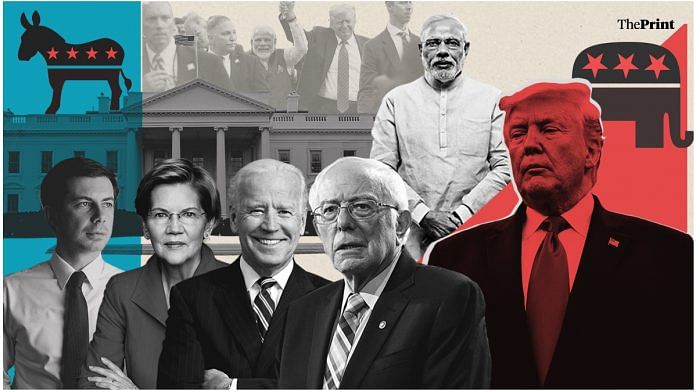US President Donald Trump is scheduled to visit India for the first time since being elected this month. His visit comes against the backdrop of India-US trade tensions, Narendra Modi government’s unhappiness with Trump’s offer of mediation on the Kashmir issue and Democratic Party candidates’ pronouncements on J&K clampdown and CAA.
ThePrint asks: Who’s better for India: Donald Trump or a Democrat leader?
Indians might find Democratic approach, which was also the Republican position before Trump, more appealing
 Aparna Pande
Aparna Pande
Director India Initiative, Hudson Institute
President Donald Trump has a transactional approach to international relations. For Indian leaders, interactions with other countries may include useful transactions but the core of the relationship always has a strategic dimension.
Trump approaches foreign leaders like he would a potential customer for one of his properties. He flatters them and makes them feel good. He has done the same with Prime Minister Modi. But at the end of the day, Trump does not always look at long-term strategic partnerships as the way forward for the United States.
Almost all the Democrats, so far, have shown an interest in a long-term strategic partnership between India and the US, based on shared values and the shared need to contain China, and managing a Free and Open Indo Pacific. Democrat leaders have viewed India as a natural ally, the strategic partner of choice and characterised the relationship as the defining partnership of the 21st century.
Indians might find the Democratic approach, which was also the mainstream Republican position before President Trump, more appealing.
Trump is unpredictable, self-centred, disruptive & transactional. In his second term, he could become more so
 Kanwal Sibal
Kanwal Sibal
Executive council member, VIF, and former foreign secretary
The US foreign policy towards India will be based on its national interest, and the reverse is also true. Personalities do play a role, but the deeper drivers of the India-US relations will be the evolution of the international situation, shifts in relations between US-India and others, economic considerations and those of defence and security.
In recent years, Republican presidents like George W. Bush and Democratic ones like Barack Obama have been positive towards India, and that is an important perspective. Issues such as countering China, the Indo-Pacific, stronger defence and energy ties, growing economic relationship, combating terrorism, the present dynamism of the India-US ties will continue irrespective of who becomes the US president. Alongside, pressures on trade issues, market opening, US policies towards Pakistan and Afghanistan will continue to be problematic for us.
US President Donald Trump is unpredictable, self-centred, disruptive and transactional. In his second term, he could become more so. Forging a good personal equation with him does not guarantee protection against pressures or erratic behaviour because his high personal regard for Chinese President Xi Jinping and severe trade sanctions on China show. Trump, unlike the Democrats who emphasise human rights issues and minority rights in US foreign policy and could generate pressure on us, would be more manageable for India.
Explore new opportunities instead of getting bogged down in determining whether a Democrat or Republican is better
 Arun Singh
Arun Singh
Former Indian ambassador to the US
India-US relations have moved with a sustained positive trajectory since 2000 under Democrat Bill Clinton, Republican George W. Bush, Democrat Barack Obama, and Republican and unpredictable Donald Trump.
It is important to sustain the bi-partisan support for the India-US relationship. At various stages in history, it has had difficulties under Democrats as well as Republican presidents as was the case with Richard Nixon in 1971.
Under Trump, there have been difficulties on trade front and uncertainties regarding the US approach to Pakistan, especially on account of its desire for reconciliation with the Taliban in Afghanistan. Under Democratic leadership, we have at times come under criticism on social and environmental issues. For instance, there is currently a resolution critical of India, with more than 50 co-sponsors, being piloted in the US Congress by an Indian-American Democrat.
There is sufficient convergence in the relationship with growing bilateral, trade, investment, and defence partnership, and related to “free and open Indo-Pacific” strategies. The attempt should be to explore new opportunities with technology developments happening in 5G, AI, quantum computing, and widen the areas of interaction and convergence, instead of getting bogged down in trying to determine whether a Democrat or Republican is better.
Expect India-US ties to remain strong, regardless of whether next president is a Democrat or Trump 2.0
 Michael Kugelman
Michael Kugelman
Deputy Director, Asia Program and Senior Associate for South Asia, Wilson Center
There is a myth, intensified by Democrat-dominated criticism of India on Capitol Hill, that the Republican Party is friendlier to India than the Democrat Party. This may be true to an extent, even though several data points—from the deeply pro-Pakistan sentiments of prominent Republican lawmakers such as Lindsay Graham and the late John McCain to the large number of Democrats in the Congressional India Caucus—suggest it’s a bit of a misconception.
At any rate, today there remains robust bipartisan support in favour of a strong US-India relationship. On both sides of the aisle, there is an entrenched belief that the strategic rationale for partnership—driven by a shared concern about China, among other things—remains sound.
To be sure, a liberal Democrat in the White House may push India harder on rights issues than would a Republican. This means that one of the pillars of partnership—shared values—may take a modest hit under a Democratic administration. But the other, and more important, foundation of the relationship—shared interests—would remain entrenched.
The takeaway: Expect the relationship to remain strong, warts and all, regardless of whether the next president is a Democrat or Donald Trump 2.0.
Right now, Republicans are a better bet for India than Democrats who have gone too Left
 Abhijit Iyer Mitra
Abhijit Iyer Mitra
Senior fellow, Institute of Peace and Conflict Studies
The answer depends on the circumstance India is in. India’s problem is that it is an enforcement deficit state that oversells itself on the international stage. India overpromises and underdelivers every single time. Consequently, Indian diplomacy is transactional and aimed at failure compensation. The defence mechanism is to make our diplomacy sound esoteric, and abstract everything to values and a bright future that never comes.
This, of course, is what Democrats like, unlike Republicans who live in the here and now. So, it’s much easier to fool dewy eyed Democrats whose thought patterns are focused on some fictional future Camelot.
On the other hand, India’s ‘here and now’ transactional diplomacy works for the Republicans. An example of this was how the full force of US diplomatic bullying was employed to help India get the 2008 nuclear waiver from the International Atomic Energy Agency, in return for promises of US nuclear reactor purchases. The problem of course is that India never delivers on its promises and in 4-8 years when Democrats replace Republicans, everyone forgets the promises made.
While the consequences aren’t immediate because of Washington’s inefficient transfer of institutional memory, the cumulative result is severe India fatigue across the board. Right now, even though it safe to say Republicans are a better bet because of absent tangibles, we align much better with their world view than with the Democrats’ who’ve gone looney Left.
Also read: US kills Iran’s Soleimani: Is it a wise act or Trump’s foolhardiness in an election year?
By Pia Krishnankutty, journalist at ThePrint




That’s a funny question. So re you saying, if Hitler was better for India, we should have supported Hitler.
What’s better for America should be the guy in power and India needs to coexist with him or her.
Trump is core Capitalist and puts American interest first. He is extremely volatile and has fewer friends. However, unlike other US Presidents, he is not manipulative. Historically, Democrats have been toxic for India. Clinton never liked India and Obama was bound by compulsion as the US alliance with Pakistan fell apart. The current lot of Democrats live in an alien world made up of roses and candy trees. They won’t be able to balance their impractical liberal views viz-a-viz China or India. While Biden is unlikely to be bad for India but will be victory lap for China and indirectly bad for India.
President Trump is nobody’s friend. Leaders of countries like Japan and Britain, whose special relationships with the US India cannot hope to replicate, have found this out to their cost. On issues as important as TPP and the Paris Accord. So India should moderate its expectations in case there is a second term. 2. India’s privileged friendship with the US ranks above any other bilateral relationship. It should not be impaired by partisan politics, which is also seen now in Britain. We also lack the ability the Chinese have to agree to buy another $ 200 billion of US exports in the next two years to win favour. Smart diplomacy is required. It would help to choose envoys who have at least three years of residual service. Anatoly Dobrynin served served as Soviet Ambassador to the US from 1962 to 1986.
Trump is a great friend for India. He is steady on his promises as shown by his insistence to implement his election promises. He is great strategist as seen in election 2016 and his ability to get USMCA agreement done inspite of opposition. He has consistently helped his friends like Netanyahu of Israel.